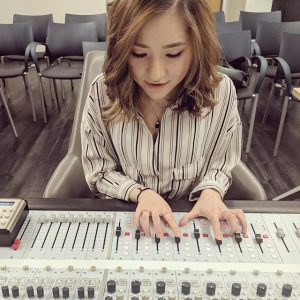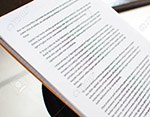In the Home Studio with
Seira McCarthy
Audio Technology Workshop
Join recording engineer Seira McCarthy in this three-part workshop that will prepare you to setup your own home recording studio and produce your audio and video project!
About the Event
Welcome to the home studio workshop! Now that we’re all working from home, we realize that having a nice environment for a home studio is EVERYTHING. One of my main jobs during my last semester at San Francisco Conservatory of Music, was to assist in teaching instrumentalists how to record themselves with good quality audio. It is one thing to teach students in the Technology and Applied Composition (TAC) program who are already fluent in technology about recording, but to these non-TAC students, throwing professional audio terminologies to them just wasn’t the right way. And after the pandemic happened, our school shifted everything to online. I worked closely with my manager and the director of recording services to teach this class, and try to make it even possible online. That’s when I learned that recording yourself at home is trickier than I expected. As a working AV technician at SFCM, having great equipment to produce high quality product was something we found normal. Once we figured out that we can’t easily have access to them anymore, I started to discover new and creative ways that can save us from buying tons of expensive gear and trying to duplicate the professional studio environments we used to imagine we couldn’t live without.
My goal is to give you the tools to do excellent home recordings with minimal expense and great results. I hope you enjoy our workshop!
– Seira McCarthy
About the Mentor
 Seira McCarthy is a recording and mixing engineer for music in films and video games. She takes her artistry for recording sounds with her classical music background to capture and mix hybrid scores for ensembles and orchestras. She currently is the Japanese Dialog Editor and Script Supervisor for the #1 meditation and sleep app Calm.com, Inc. In May 2020, she received her Bachelor of Music degree from the Technology and Applied Composition program at San Francisco Conservatory of Music. Seira is also the studio manager and AV technician of AV Recording Services at SFCM, and has recorded and operated live sound for various artists such as the Telegraph Quartet, Friction Quartet, Bay Area Rainbow Symphony, International Contemporary Ensemble, KDFC Sound Logo Competition, the Ross McKee Foundation, Gordon Getty, and Mercury Soul (led by composer Mason Bates). Last summer in 2019, she was in Aspen, Colorado as the Assistant Recording Engineer for the Aspen Music Festival, where she primarily recorded live chamber music for artists including Joyce Yang, Conrad Tao, Paul Huang, David Finckel, and Wu Han. In 2018, she worked at Sony PlayStation in San Mateo, CA, as the Production Assistant for the music team, where she worked on music editing and music engine testing for AAA game titles including Death Stranding (2019), Days Gone (2019), and Spider-Man (2018). While continuing her work at Calm.com and SFCM, she also is the Audio Tester for the Technology Strategy team at Dolby Laboratories, Inc., where she helps conduct immersive audio experiments for surround sound systems. As she continues to work as a freelance audio engineer in San Francisco, she is looking into getting back to the video game industry, where she can work on more games in the future.
Seira McCarthy is a recording and mixing engineer for music in films and video games. She takes her artistry for recording sounds with her classical music background to capture and mix hybrid scores for ensembles and orchestras. She currently is the Japanese Dialog Editor and Script Supervisor for the #1 meditation and sleep app Calm.com, Inc. In May 2020, she received her Bachelor of Music degree from the Technology and Applied Composition program at San Francisco Conservatory of Music. Seira is also the studio manager and AV technician of AV Recording Services at SFCM, and has recorded and operated live sound for various artists such as the Telegraph Quartet, Friction Quartet, Bay Area Rainbow Symphony, International Contemporary Ensemble, KDFC Sound Logo Competition, the Ross McKee Foundation, Gordon Getty, and Mercury Soul (led by composer Mason Bates). Last summer in 2019, she was in Aspen, Colorado as the Assistant Recording Engineer for the Aspen Music Festival, where she primarily recorded live chamber music for artists including Joyce Yang, Conrad Tao, Paul Huang, David Finckel, and Wu Han. In 2018, she worked at Sony PlayStation in San Mateo, CA, as the Production Assistant for the music team, where she worked on music editing and music engine testing for AAA game titles including Death Stranding (2019), Days Gone (2019), and Spider-Man (2018). While continuing her work at Calm.com and SFCM, she also is the Audio Tester for the Technology Strategy team at Dolby Laboratories, Inc., where she helps conduct immersive audio experiments for surround sound systems. As she continues to work as a freelance audio engineer in San Francisco, she is looking into getting back to the video game industry, where she can work on more games in the future.
(Full bio)
Workshop Materials
SERIES OUTLINE and ARCHIVE VIDEOS

Session One: The Preparation
- What makes something sound and look “high quality”? What do I look for when buying equipment?
- Important (basic) audio and video terminologies
- Differences in quality – learning between poor and good
- What equipment can I start with?
- Basic affordable equipment vs studio gear
- Microphones – what is best for me?
- How do I turn my bedroom into a recording studio?
- Room treatment to control acoustics and physics of sound
- Bad room noise situations to look out for and how to avoid them
- Setting up equipment for the best possible quality
- Camera placement and good framing rules
- Microphone placement – how does sound travel out of an instrument?

Session Two: The Recording Session
- Ready to record – Which software should I use?
- Introduction to DAW – brief overview of Reaper
- Click tracks – the most forgotten step
- How and why click tracks are crucial when recording multiple tracks
- Recording time – live demonstration
- Best recording practices before playing – things to remember before it’s too late
INSTRUCTIONS on downloading, installing, and using Reaper
VIDEO we’ll refer to in this session

Session Three: Post-Production / Putting it all together
- Introduction to video editing
- Phone app editing vs computer software
- Audio editing and mixing – how to make you sound like you’re in a concert hall
- Reverbs and other sources
- Audio mastering and exporting
- Volume mastering for online
OTHER MATERIALS

Online Q&A

Session One Slideshow
